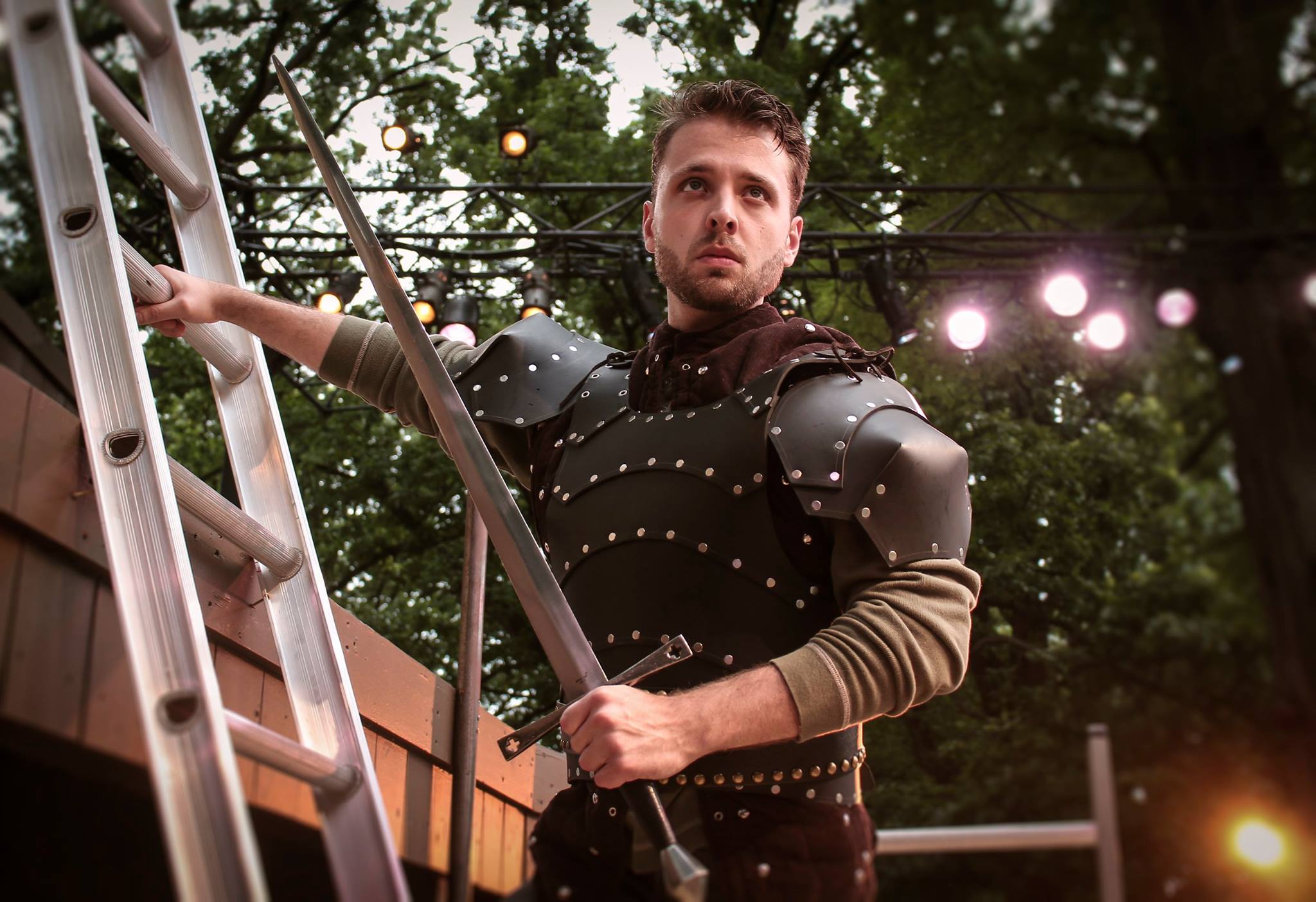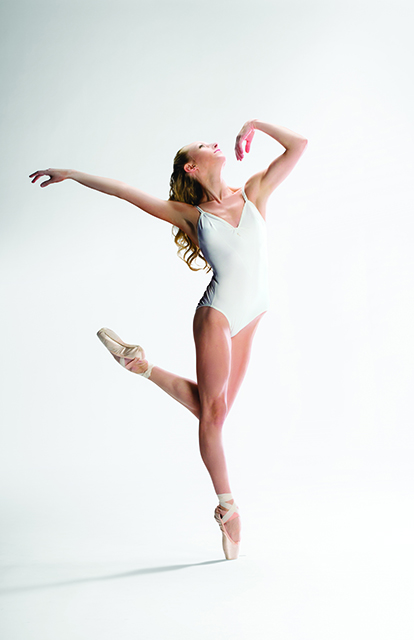Matt Lytle in Henry V.
Photo-Matthew Chappell/Kentucky Shakespeare
Henry V
By William Shakespeare
Directed by Amy Attaway
Review by E. P. Stewart
Entire contents copyright © 2014 by E. P. Stewart. All rights reserved.
Late on a warm summer afternoon, just hinting at the beginnings of dusk, I looked over my shoulder at the faces of a rather diverse community – men and women of all ages, all colors, all types – rapt with attention for the scene beginning to unfold before them. I spent several minutes marking the vast differences between these individuals and beaming inwardly at the same transported gaze that tied them together. This, I thought, is the power of theatre. And turning around, I settled back into my own green park bench under a peachy-pink, cloud-studded sky to focus on the story at hand.
For those unfamiliar with the Bard’s work – outside of, perhaps, those few Cliffs–Notes-fueled high school cram sessions – Henry V is the final installment in a four-play series detailing the reigns of English kings Richard II, Henry IV, and Henry V. In Shakespeare’s Henry V, the previously wild and undisciplined Prince Harry has recently become king and is maturing into a decent ruler, but he finds his old reputation hard to shake. The French, in particular, continue to underestimate him. When Harry lays claim to a disputed territory, the French Dauphin responds with a barrel of tennis balls and the message that playing suits the new king more than ruling. Harry vows to make the Dauphin regret this mock and proceeds to lead his men to victory over France’s much more powerful army, winning all of France for England. The play ends with him wooing and marrying France’s beautiful Princess Catherine.
My criticisms of this production are few and scattered, so I’d like to get them out of the way.
First, I wanted more music. The company enters at the top of the show holding an array of musical instruments. They pluck at guitars and tap on drums like wandering minstrels about to start into the ballad of Henry V, and as they entered I actually wondered if the famous opening speech (O, for a muse of fire…) had been set to tune. But no sooner had they stepped onstage than the actors emptied their hands, and the first scene began. What a tease! Some music did come into play throughout the performance, but besides the ever-popular horn, its use never felt very integral to the action of the story. It was a bit of a letdown to introduce the cast in such a way but not to let more musical threads be woven throughout the production, especially with a local gem like Scott Anthony on hand as composer.
Second, while the costumes as a whole were beautifully done by Donna Lawrence Downs, and attention was clearly paid to details that successfully furthered characterization – Harry’s studded vest and belt were perfections for the cocky rascal-turned-king – I was a little thrown that some of the men seemed to be wearing plain khakis or jeans, while most actors looked dressed for the period. I’m sure this was a purposeful choice, probably intended to bring a contemporary twist into the design scheme, but ultimately there wasn’t quite enough blending of modern and medieval throughout the rest of the production for the effect to make contextual sense. A minor issue.
Third, I would have been very excited to see the Ramey venue used in more unpredictable ways. Let me point out that it was great to see the entire amphitheater (aisles and all) integrated into the performance, and it made perfect sense to place the English and French camps where they were, to have offensive charges move to upstage to climb the ladders as they did, to place all main action on the ground level, etc. It did no disservice to the story to stage things as they were. But, it felt safe. There was a predictability to the flow of the action, andHenry V has such a powerfully tense, frenetic undercurrent that it would have been refreshing to see bold risks are taken or surprising conventions established with the staging.
Okay, now for the good stuff. There is a lot to love about this show
I’ll begin with the nail-biting fight choreography of J. Barrett Cooper. While I do think that a bit more could have been done to smooth the transitions from dialogue to action and back, quite frankly I didn’t care. Each clash of metal on metal, pounding of sword against shield, and a narrow escape from a swinging blade had me literally on the edge of my seat, moving back and forth unconsciously with every parry and thrust. Having had a class or two in stage combat myself (and being quite the slow learner), I am amazed both by how much effort must have gone into learning and rehearsing these epic battles and by how heart-poundingly realistic the actors make them feel. The thing about stage combat in theatre, without the benefits of camera angles and special effects afforded to film, is that it’s always obvious from one sightline or another that a huge metal sword did not actually just pierce a character straight-through. But, the ability of these actors to make every moment feel as urgent, frightening, and painful as an actual fight to the death easily overcame this challenge and allowed Cooper’s choreography to become a real live battle. And, what’s more – after a brief rain delay before any of the fight scenes took place, there was an announcement that all combat would be slowed to 3/4 speed for safety. I can’t imagine how blazingly fast the swordplay must be in full force and can only say that audiences who get to see it are surely in for a real treat.
Mention of the rain delay brings me to my next accolade – the flexibility and sheer, all-around joy with which the actors and festival staff approached the evening. Saying that the weather didn’t dampen any spirits is a major understatement. If anything, it seemed to improve the experience, infusing the performance with a sense of camaraderie betwixt actors and audience that harkened back to the days of Shakespeare himself, when sitting quietly at a play just wasn’t in the lexicon. As the audience settled in and the lights came up following the delay, one gentleman quickly shouted an encouraging Shakespearian quotation to the actors, and King Henry (Matt Lytle) himself paused to graciously say “Thank you for that,” before beginning the rest of the second act. And earlier, just after the delay was announced, another fellow raised the cry “Three cheers to the cast and crew! Hip-hip!” The rest of the crowd responded with three hearty hoorays even as jackets were pulled over heads and people scattered to find cover from fat raindrops.
A sense of play was in the air from the moment the Chorus (Megan Massie) first called for “a muse of fire,” eagerly encouraging us spectators to help make the story come to life in the fullness of glory that is only possible with imagination. I must admit that I did not immediately understand Massie’s choices for the Chorus and felt rather underwhelmed by her first appearance. I was used to a very serious Chorus, a dark figure mystically spinning this tale of proving one’s worth through bloody battle and hard-fought victory. It wasn’t until the moment that Massie suddenly shifts, from a scene as the positively adorable Catherine (whom she also plays) into the Chorus for another monologue, that it clicked for me. The girl was playing. I suddenly realized that Henry V need not be dark; it is, after all, a play. This Chorus is not a brooding soothsayer; she is a breath of fresh air.
Oh, and those French scenes between Catherine and her maid Alice (Abigail Bailey Maupin)? It is certainly worth mentioning that, despite the fact that the dialogue occurs almost entirely in a foreign tongue, in Massie’s and Bailey Maupin’s capable hands they are easily the crispest, clearest interchanges in the production. And this is a production that’s far from unclear.
On the whole, the actors did beautifully. They made sense of the language while connecting emotionally, and they were fantastic at feeling their audience and negotiating the elements. At the top of the show, as a plane flew loudly overhead, muffling the dialogue, Harry took a brief moment to gaze up at the noise, then threw his next line (a reference to God) skyward. The audience loved it. I do think Lytle could have found more maturity and toned down the swagger a hair sooner – early battle scenes still felt more like a cocky boy itching for a fight than a king leading his men into war – but he certainly ended up where he needed to be, and his general manner and physicality were consistently in line with Harry’s timeworn image.
There was not a weak link in this cast, and the production is truly an ensemble triumph. Tia Davis (Queen Isabel) would be a queen were she dressed in rags; Karina Strange (Mistress Quickly, Captain Gower) never fails to delight; Dathan Hooper’s (Duke of Exeter) vocal quality can convey the emotion of Shakespeare’s words with little more than simply speaking them; Maggie Lou Rader (Girl, Duchess of Burgundy) commands your attention; Jon O’Brien (King Charles IV of France, Constable of the French Army) is realistic and understatedly clear; Tony Milder (The Dauphin) is as perfectly annoying, entitled, and ridiculous as he ought to be. Kyle Ware, Daniel Hill, and Zachary Burrell are somewhat reminiscent of the Three Stooges as Pistol, Bardolph, and Nym, respectively. And Eric Warner, Madison Neiderhauser, and Jeremey Sapp round out the cast of characters very nicely in various supporting roles.
Two actors who deserve special mention are husband and wife team Gregory Maupin and Abigail Bailey Maupin. Each is individually phenomenal. Greg is the real deal as the often-ridiculous Welshman, Fluellen. He doesn’t miss a beat, or a joke, or a syllable of that dialect. And Abigail has both a captivating strength as the Duke of Bourbon and a charming optimism as maid Alice. Also to her credit, I didn’t even realize until the end of the performance that both characters were played by the same person. This was my first time seeing these local legends onstage. I certainly hope it won’t be my last.
Lest I leave anybody out, set designer Paul Owen used his space well by making various levels of the stage accessible via ladders that functioned particularly well in battle scenes. Lighting designer Casey Clark seemed to mostly take cues from God, unobtrusively allowing the natural scenes to take place within the parameters of the outdoor amphitheater. The beautiful night around us was night onstage as campfires glowed mere hours before the Battle of Agincourt. I think my original wish for additional music might fall at the feet of sound designer Michael Boso, but I did enjoy his concept of using onstage instruments played by the cast for sound effects. Director Amy Attaway told a clear story and encouraged good performances from her actors, and I can only assume that stage manager Mo Stucker had everything stunningly under control, as the entire performance ran without a hitch from start to finish (except for one brief moment of an offstage actor’s mic being live – but the system is brand new this year, so I’m sure there are still a couple kinks) despite the rain hold.
And, finally: Matt Wallace. While perhaps not directly involved with this particular production, my hat is off to this man for taking an institution that for years had been dragged along in the wake of damaging leadership and helping it to blossom once more into the beautiful display of creativity, passion, unity, and fun that Louisville has loved for decades. (For those who don’t know, the previous artistic director of Kentucky Shakespeare Festival left amidst allegations of professional misconduct, sexual harassment, and financial mismanagement following his abrupt cancellation of half the season and the revelation that it was due to a restraining order filed against him by his wife, the show’s lead actress, for supposed threats against her life. Yes, that all really happened.) Wallace has obviously taken this year’s unique responsibilities seriously, casting primarily local actors and championing greater involvement of the Louisville theatre community by integrating local companies’ work into the festival schedule. The inclusive energy he has brought back to “the park” is palpable and was clearly reflected in the audience’s own enthusiasm and joy at Henry V‘s opening performance.
What more is there to say? This is certainly the longest review I’ve ever written, but I did so because I truly felt that everyone deserved a mention. As a native Louisvillian who lived in New York for many years – and was homesick nearly every single day of it – I have a love and a pride for this place that I think only those who’ve had to move away can fully understand. Louisville is a city that isn’t afraid of hard work but always loves to have a good time. We, its citizens, are friendly to our neighbors and to strangers alike. We are a people who cherish our own history and culture and who deeply value the arts. We are a community that roots for each other. This summer’s Kentucky Shakespeare Festival embodies all of these things. The hard work of staff, company, and crew has brought this institution out of its darkest days and back to the people who love and deserve all that it has to offer. I, for one, can’t wait to see the rest of this season and whatever the future has in store.
Henry V
June 25-29, July 1-6, July 17, 20, 22, 25, 26 2014
Free Admission to All Performances
7:15 Pre-show/8:00pm Curtain
Kentucky Shakespeare
C. Douglas Ramey Amphitheatre
1340 South Fourth Street
Louisville, KY 40208
502-574-9900
KYShakespeare.com





